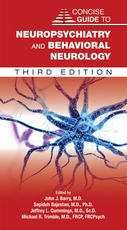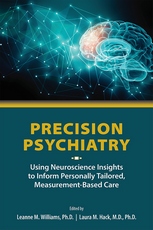Psychiatric Genetics
Applications in Clinical Practice
View Pricing
Description
As more patients seek information about family risks of psychiatric illness—an interest likely to increase as gene-identification studies are publicized—most psychiatrists agree it is their role to discuss these issues but admit they are ill-prepared to do so. Psychiatric Genetics addresses that need as the first book to focus on clinical applications of genetics in psychiatry. It covers issues involved in genetic counseling, the interpretation of familial and genetic information for clinical use, information regarding risks associated with specific psychiatric disorders, risk/benefit considerations related to medication use during pregnancy, and the ethical and social implications of psychiatric genetic knowledge and research—including the prospects for genetic testing.
While other books have been written for the genetics community, this volume is addressed to practitioners: a clinically relevant resource that can help them understand the often bewildering flood of information about genetics—information difficult to interpret, let alone integrate into practice—and enable them to respond to patients' requests to predict the risk of recurrence of psychiatric illness or provide information about reproductive and pregnancy-related issues. Experts from psychiatry, genetic epidemiology, molecular genetics, genetic counseling, cognitive psychology, and ethics focus on issues that have received little attention elsewhere yet are of increasing importance to clinicians. Written at a level that assumes no particular expertise in genetics, the book features these immediately applicable benefits:
- It offers a framework for understanding and critically evaluating the psychiatric genetic research literature, enabling clinicians to better understand the meaning and limitations of genetic discoveries when patients raise questions about media reports.
- It provides a resource for clinicians who would like more information about the role and content of genetic counseling, outlining a typical counseling session while demonstrating how risks are estimated and discussed.
- It summarizes genetic aspects of major psychiatric conditions—from childhood-onset disorders through psychotic, mood, and anxiety disorders to dementia—as well as neuropsychiatric manifestations of other genetic disorders.
- It alerts clinicians to risk/benefit considerations related to medication use during pregnancy.
- It covers the ethical, legal, and social implications of genetic research and counseling, illustrating the dilemmas that arise with new advances.
Whether used as a clinical guide, reference, or ancillary text, this book sets the standard for the application of psychiatric genetic knowledge in everyday practice. Psychiatrists, mental health clinicians, and genetic counselors will find it an essential resource for all patient encounters in which genetic issues arise.
Contents
- Contributors
- Preface
- Part 1: General Principles
- Chapter 1. Psychiatric Genetics: A Primer
- Chapter 2. Principles of Genetic Counseling
- Chapter 3. Risk Communication: Simple Tools to Foster Understanding
- Part 2: Genetics of Specific Disorders
- Chapter 4. Genetics of Childhood-Onset Psychiatric Disorders
- Chapter 5. Genetics of Schizophrenia and Psychotic Disorders
- Chapter 6. Genetics of Mood and Anxiety Disorders
- Chapter 7. Genetics of Alzheimer's Disease
- Chapter 8. Neuropsychiatric Aspects of Genetic Disorders
- Part 3: Special Topics
- Chapter 9. Perinatal Psychiatry and Teratogenicity
- Chapter 10. Ethical, Legal, and Social Implications of Psychiatric Genetics and Genetic Counseling
- Chapter 11. The Road Ahead
- Glossary
- Index
Contributors
- George S. Alexopoulos, M.D.
Margaret Altemus, M.D.
Donna T. Anthony, M.D., Ph.D.
Paul S. Appelbaum, M.D.
Elizabeth L. Auchincloss, M.D.
Jack D. Barchas, M.D.
John W. Barnhill, M.D.
Hilary J. Beattie, Ph.D.
Marina Benaur, M.D.
Andrew Bennett, M.D.
William Breitbart, M.D.
Beth S. Brodsky, Ph.D.
Richard P. Brown, M.D.
Martha Bruce, Ph.D.
Fredric N. Busch, M.D.
Deborah L. Cabaniss, M.D.
Ian Canino, M.D.
John F. Clarkin, Ph.D.
Arnold M. Cooper, M.D.
Francine Cournos, M.D.
Janis L. Cutler, M.D.
Katherine Dalsimer, Ph.D.
Carolyn J. Douglas, M.D.
Jane Epstein, M.D.
Aaron Esman, M.D.
Susan Evans, Ph.D.
Brian A. Fallon, M.D.
Stephen J. Ferrando, M.D.
Marianne N. Findler, Ph.D.
Joseph J. Fins, M.D.
Peter J. Freed, M.D.
Zachary Freyberg, M.D., Ph.D.
Richard A. Friedman, M.D.
Richard C. Friedman, M.D.
William Frosch, M.D.
Mindy Thompson Fullilove, M.D.
Cathryn A. Galanter, M.D.
David W. Galarneau, M.D.
Patricia L. Gerbarg, M.D.
Andrew J. Gerber, M.D., Ph.D.
Roberto Gil, M.D.
Charles Glatt, M.D., Ph.D.
Robert A. Glick, M.D.
Scott J. Goldsmith, M.D.
Michael F. Grunebaum, M.D.
Katherine A. Halmi, M.D.
Jeffrey K. Halpern, M.D.
David J. Hellerstein, M.D.
Daniel Herrera, M.D., Ph.D.
Margaret E. Hertzig, M.D.
Kim Hopper, Ph.D.
Colleen Jacobson, Ph.D.
David Kahn, M.D.
Gurmeet S. Kanwal, M.D.
Kevin V. Kelly, M.D.
Otto F. Kernberg, M.D.
Robert Kertzner, M.D.
Kenneth L. Kirsh, Ph.D.
David W. Kissane, M.D.
Sibel Klimstra, M.D.
James H. Kocsis, M.D.
Nathan Kravis, M.D.
Yulia Landa, Psy.D.
Francis Lee, M.D., Ph.D.
Phillip Lee, M.D.
Eve Leeman, M.D.
Steven P. Levine, M.D.
Petros Levounis, M.D., M.A.
Jeffrey A. Lieberman, M.D.
Sarah H. Lisanby, M.D.
George J. Makari, M.D.
J. John Mann, M.D.
Eric R. Marcus, M.D.
John C. Markowitz, M.D.
Peter M. Marzuk, M.D.
Mary Jane Massie, M.D.
Marlin R.A. Mattson, M.D.
P. Anne McBride, M.D.
Bruce S. McEwen, Ph.D.
Robert Michels, M.D.
Sharon Alspector Mozian, M.D.
Laura Mufson, Ph.D.
Philip R. Muskin, M.D.
Alfredo Nudman, M.D.
Sharone Ornstein, M.D.
Laszlo A. Papp, M.D.
Sandra Park, M.D.
Steven D. Passik, Ph.D.
Ethel S. Person, M.D.
Cynthia R. Pfeffer, M.D.
Bruce Phariss, M.D.
H. Jonathan Polan, M.D.
Shannon R. Poppito, Ph.D.
Dionne R. Powell, M.D.
James L. Rebeta, Ph.D.
Diane Rudolph, M.D.
Adam Savitz, M.D., Ph.D.
David W. Schab, M.D.
Roy Schafer, Ph.D.
Daniel S. Schechter, M.D.
Franklin Schneier, M.D.
Peter A. Shapiro, M.D.
Theodore Shapiro, M.D.
David Silbersweig, M.D.
Helen Blair Simpson, M.D., Ph.D.
Smit S. Sinha, M.D.
Alexandra L. Sporn, M.D.
Barbara H. Stanley, Ph.D.
Jennifer Cooper Stelwagon, M.D.
Charles P. Stowell, M.D.
Ayame Takahashi, M.D.
Michael Terman, Ph.D.
Susan C. Vaughan, M.D.
Milton Viederman, M.D.
Daniel Weisholtz, M.D.
Erica Willheim, Ph.D.
Frank Yeomans, M.D., Ph.D.
Robert C. Young, M.D.
About the Authors
Jordan W. Smoller, M.D., Sc.D., is Associate Professor of Psychiatry at Harvard Medical School; Associate Professor in the Department of Epidemiology at the Harvard School of Public Health; Assistant Vice Chair of the Department of Psychiatry at Massachusetts General Hospital; Director of the Psychiatric Genetics Program in Mood and Anxiety Disorders in the Department of Psychiatry; co-Director of the Genetics and Genomics Unit of the Massachusetts General Hospital Clinical Research Program; and a faculty member in the Center for Human Genetic Research at Massachusetts General Hospital in Boston, Massachusetts.
Beth Rosen Sheidley, M.S., CGC, is Associate Professor of the Practice and Co-Director of Research and Professional Development in the Genetic Counseling Program in the Department of Biology at Brandeis University in Waltham, Massachusetts; and Genetic Counselor in the Division of Genetics and Metabolism at Tufts Medical Center, Floating Hospital for Children, in Boston, Massachusetts.
Ming T. Tsuang, M.D., Ph.D., D.Sc., is Behavioral Genomics Endowed Chair and University Professor at the University of California; Distinguished Professor of Psychiatry and Director of the Center for Behavioral Genomics in the Department of Psychiatry at the University of California, San Diego in La Jolla, California; Adjunct Professor and Director of the Harvard Institute of Psychiatric Epidemiology and Genetics in the Department of Epidemiology at the Harvard School of Public Health in Boston, Massachusetts; and Senior Lecturer at the Massachusetts Mental Health Center Academic Division of Public Psychiatry in the Department of Psychiatry at Beth Israel Deaconess Medical Center and Harvard Medical School in Boston, Massachusetts
Related Products
Carousel Control - items will scroll by tabbing through them, otherwise arrows can be used to scroll one item at a time








